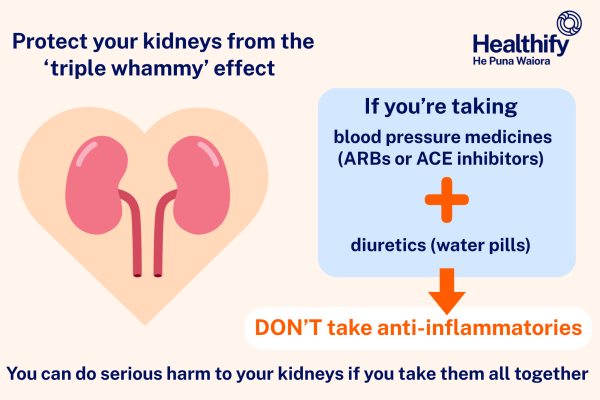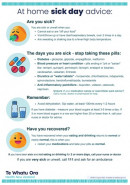You can now add Healthify as a preferred source on Google. Click here to see us when you search Google.
Indapamide
Sounds like 'in-dap-ah-mide'
Key points about indapamide
- Indapamide is a diuretic, which means it helps your body get rid of extra salt (sodium) and water.
- It's also called Dapa-Tabs®, a ‘water tablet’ or ‘water pill’.
- Find out how to take it safely and possible side effects.

Indapamide is used to treat high blood pressure (hypertension). It's a diuretic, which means it helps your body get rid of extra salt (sodium) and water.
It's also called a 'water' tablet or 'water pill' because it works by increasing the amount of urine (pee) you make.
At the doses used for high blood pressure, indapamide is thought to work by relaxing the blood vessels, allowing them to become wider and lowering the pressure within them.
In Aotearoa New Zealand, indapamide is available as tablets (Dapa-Tabs® 2.5 mg).
- Always take your indapamide exactly as your healthcare provider has told you. The pharmacy label on your medicine will tell you how much indapamide to take, how often to take it and any special instructions.
- The usual dose is 1 tablet once a day, in the morning.
- Treatment with indapamide is usually long term, so keep taking it regularly.
- Timing: Take indapamide once a day. It's best taken in the morning so it works during the day and your sleep isn't disturbed by you needing to get up to go to the toilet during the night. Read more about tips for taking diuretics.
- Food: You can take indapamide with or without food.
- Missed dose: If you forget to take your dose, take it as soon as you remember. But if it's late in the afternoon, skip the missed dose and continue as usual the next day. Don't take double the dose.
Taking indapamide with pain medicines
Be careful when taking some pain relief medicines. Taking NSAIDs, such as ibuprofen and diclofenac, together with blood pressure medicines, can be harmful to your kidneys. This is called the ‘triple whammy’. NSAIDs can also be found in some cold and flu medicines.
If you're taking indapamide with other blood pressure medicines, such as ACE inhibitors or ARBs, tell your healthcare provider or pharmacist before starting NSAIDs. Talk to them about safe pain-relief options for you.

Image credit: Healthify He Puna Waiora
Read more about:
Some other things to know when you're taking indapamide
- Have a sick day plan: If you have diarrhoea (runny poo) or vomiting (being sick) from a stomach bug, or you're dehydrated from another illness, it’s important to let your healthcare provider know. They may advise you to stop taking indapamide for a few days and start again when your eating and drinking returns to normal.
- Alcohol: Indapamide doesn't directly interact with alcohol. This means that most people could have the occasional drink while taking it without any serious problems. However, if indapamide makes you feel dizzy or nauseous (sick), don't drink alcohol as it will make you feel worse.
- Sunlight: Protect yourself from too much sunlight while being treated with indapamide. Always cover up and apply a thick layer of broad spectrum sunscreen (at least SPF 30) when you're outside. Don't use sunbeds.
- Monitoring: You may need blood tests while taking indapamide to check the amount of potassium and sodium in your blood, and to see how well your kidneys are working.
- Interactions: Indapamide may interact with other medicines, herbal supplements and rongoā Māori, so check with your healthcare provider or pharmacist before starting indapamide and before starting any new products.
- Pregnancy or breastfeeding: Talk to your healthcare provider if you're pregnant, planning a pregnancy or want to breastfeed.
Like all medicines indapamide can cause side effects, although not everyone gets them. If you're concerned about any symptoms you think might be related to your medicine, talk to your healthcare provider. The following information offers some guidance but doesn't include all possible side effects.
Common side effects
Tell your healthcare provider if these side effects bother you.
- Nausea (feeling sick) or having a sore stomach: Take your indapamide with or just after food.
- Feeling light-headed or dizzy: Limit or don’t drink alcohol. It can make these side effects worse. Be careful when driving or using tools until you know how this medicine affects you.
- Feeling faint when you stand up: This puts you at risk of falls and injuries, especially if you're an older adult. Be careful when getting up from either lying down or sitting to avoid falls.
Tell your healthcare provider immediately or phone Healthline free on 0800 611 116 if these occur
- Signs of dehydration (losing too much salt and water) such as muscle cramps, weakness, dry mouth, feeling thirsty all the time or passing less urine than usual.
- Signs and symptoms of gout such as pain and swelling in your joints. Indapamide may raise serum uric acid levels and cause an acute attack of gout in some people
Phone 111 for an ambulance or go to your nearest accident and emergency (A&E) clinic if these occur
- Signs of an allergic reaction such as itchy skin, and rash, swollen lips or tongue, problems breathing, like a tight chest or shortness of breath.
Read more about medicines and side effects and reporting a reaction you think might be a side effect.
The following links have more information on indapamide.
Dapa-Tabs(external link) Medsafe Consumer Information Sheets, NZ
Indapamide(external link) NZ Formulary Patient Information
Brochures
At home sick day advice(external link) Health New Zealand | Te Whatu Ora, NZ, 2023
Medicines and side effects(external link) Healthify He Puna Waiora, NZ, 2024
5 questions to ask about your medications(external link) Health Quality and Safety Commission, NZ, 2019 English(external link), te reo Māori(external link)
References
- Indapamide hemihydrate(external link) NZ Formulary
- Dapa-Tabs(external link) Medsafe datasheet, NZ
- Medicine-induced hyponatraemia – increased risks in older people(external link) Medsafe, NZ, 2024
- Avoiding the triple whammy in primary care – ACE inhibitor/ARB + diuretic + NSAID(external link) BPAC, NZ, 2018
- Hypertension in adults – the silent killer(external link) BPAC, NZ, 2023
Brochures

At home sick day advice
Health New Zealand | Te Whatu Ora, 2023

Medicines and side effects
Healthify He Puna Waiora, NZ, 2024

Health Quality and Safety Commission, NZ, 2019 English, te reo Māori
Credits: Healthify editorial team. Healthify is brought to you by Health Navigator Charitable Trust.
Reviewed by: Stephanie Yee, Pharmacist, Auckland
Last reviewed:





